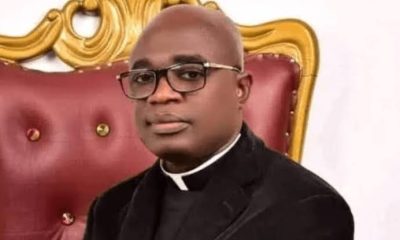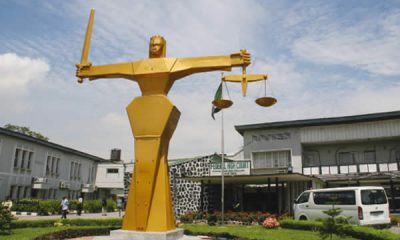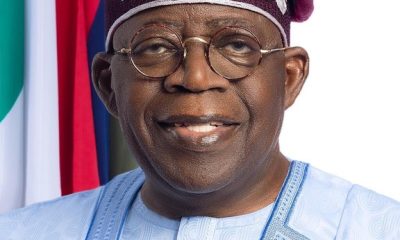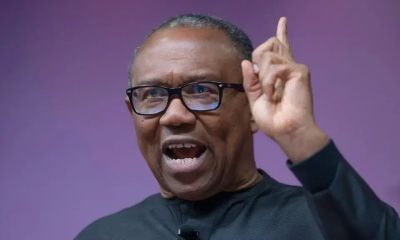Headline
Election Tribunal: Kano Govt. decries attempt to bribe Judge
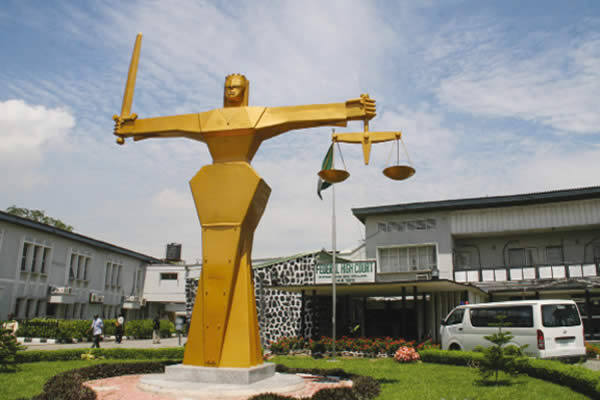
The Kano State Government has expressed concern over a bribery alert raised by the Chairman of the Kano State National and State Houses of Assembly Election Petition Tribunal, Justice Flora Ngozi Azinge.
Azinge had said that there was an attempt to bribe a member of the tribunal with money in order to sway justice in favour of a lawyer’s client.
She lamented in open court before the commencement of session on Tuesday in Kano, how senior lawyers particularly engaged in unethical practice.
A statement signed by the State Commissioner of Information, Malam Baba Halilu Dantiye, said: “The attention of the Kano State Government has been drawn to an allegation made by the chairman of Kano National and State Houses of Assembly Election Petition Tribunal, Hon. Justice Flora Ngozi Azinge, that there was an attempt to bribe a member of the tribunal with money in order to sway Justice as according to her, “money has been flying in the Tribunal”.
Dantiye said the state government viewed the incident with a great concern as there is a strong rumour that some “strong forces who are well-known for their corrupt attitude are working tirelessly to scuttle the hard-earned mandate of the people of Kano State”.
He said the State Government viewed the incident as a litmus test for the present administration to show Nigerians its commitment to fighting corruption and defending democratic principles by ensuring that the case was thoroughly investigated and the culprits prosecuted.
“The anti-corruption agencies are equally expected to swing into action, especially when this type of allegation was made in open court by a respected Judge,” he said.
The commissioner said the government, however, viewed with delight the action of Justice Azinge as a positive testimony that “there is still hope in the Nigerian judiciary, and that Judges and Justices with high sense of integrity abound in our country.
“The state government also thanked the good people of Kano that voted the NNPP into power with well over one million votes at a time when they didn’t have federal, state, local government and financial resources.
“The government, therefore, notes and appreciates the readiness of Kano people to defend their mandate through whatever means possible,” Dantiye added.
Headline
EFCC bars dollar transactions, orders embassies to charge in naira

The Economic and Financial Crimes Commission has barred foreign missions based in Nigeria from transacting in foreign currencies and mandated them to use Naira in their financial businesses.
The EFCC has also mandated Nigerian foreign missions domiciled abroad to accept Naira in their financial businesses.
The anti-graft agency said the move is to tackle the dollarisation of the Nigerian economy and the degradation of the naira
The Commission, therefore, asked the government to stop foreign missions in Nigeria from charging visa and other consular services in foreign denominations.
The EFCC gave the advisory in a letter to the Minister of Foreign Affairs, Amb. Yusuf Tuggar, for onward transmission to all foreign missions in the country.
In the letter, the EFCC said it issued the advisory because the practice of paying for consular services in dollars was in conflict with extant laws and financial regulations in Nigeria.
In a letter dated April 5, 2024, which was addressed to the Minister of Foreign Affairs, Ambassador Yusuf Tuggar, titled: “EFCC Advisory to Foreign Missions against Invoicing in US Dollar,” the EFCC Chairman, Ola Olukoyede expressed dismay over the invoicing of consular services in Nigeria by foreign missions in dollars.
The EFCC cited Section 20(1) of the Central Bank of Nigeria Act, 2007, which makes currencies issued by the apex bank the only legal tender in Nigeria.
The letter read, “I present to you the compliments of the Economic and Financial Crimes Commission, and wish to notify you about the commission’s observation, with dismay, regarding the unhealthy practice by some foreign missions to invoice consular services to Nigerians and other foreign nationals in the country in United States dollar ($).
“It states that ‘the currency notes issued by the Bank shall be the legal tender in Nigeria on their face value for the payment of any amount’.
“This presupposes that any transaction in currencies other than the naira anywhere in Nigeria contravenes the law and is, therefore, illegal.”
The commission further stated that the rejection of the naira for consular services in Nigeria by certain missions, along with non-compliance with foreign exchange regulations in determining service costs, is not just unlawful but also undermines the nation’s sovereignty embodied in its official currency.
The letter continues: “This trend can no longer be tolerated, especially in a volatile economic environment where the country’s macroeconomic policies are constantly under attack by all manner of state and non-state actors.
“In light of the above, you may wish to convey the commission’s displeasure to all missions in Nigeria and restate Nigeria’s desire for their operations not to conflict with extant laws and regulations in the country.”
Diplomatic sources said yesterday, May 10, that some embassies were wondering whether the EFCC’s advisory represented the position of the Federal Government.
Headline
Prince Harry visits sick Nigerian soldiers in Kaduna

Prince Harry and his team visited the 44 Nigerian Army Reference Hospital in Kaduna to interact with wounded soldiers who are receiving treatment.
The Duke of Sussex is in Nigeria with his wife to champion the Invictus Games, which Harry founded to aid the rehabilitation of wounded and sick servicemembers and veterans.
Nigeria joined the Invictus Community of Nations in 2022 becoming the first African country to join.
Prince Harry’s visit to Kaduna came 68 years after his late grandmother Queen Elizabeth II visited the state during the time of the late Premier of Northern Region Sir Ahmadu Bello.




-

 Headline5 days ago
Headline5 days agoPrince Harry visits sick Nigerian soldiers in Kaduna
-

 Entertainment5 days ago
Entertainment5 days agoAMVCA Cultural Day: BBNaija’s Neo, Venita win Best Dressed Male, Female
-

 Metro5 days ago
Metro5 days agoEx-Sports Minister laments after hospital neglected him for hours over N80000 deposit
-

 Headline5 days ago
Headline5 days agoEFCC bars dollar transactions, orders embassies to charge in naira

